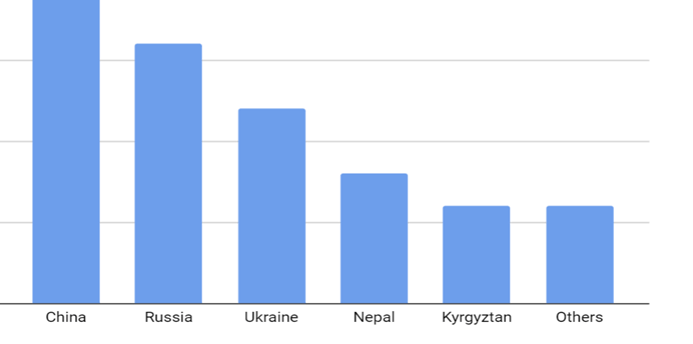The FMGE Test or Medical Council of India (MCI) Screening Test is an online test which may not be the hardest exam to crack but the Indian National Board of Examination (NBE) data shows that 84% of doctors who were foreign-educated, could not clear the FMGE test in the last 7 years.
Before we come to an analysis, it is important to understand what is the FMGE / MCI Screening Test.
What Is The FMGE Test?
The Foreign Medical Graduate Examination (FMGE Test) is an online test paper conducted by the National Board of Examination. FMGE is mandatory for Indians holding MBBS degrees from abroad. It is held twice a year (June & December).
Those who earn their MBBS degrees from UK, US, Australia, Canada and New Zealand are exempted from the MCI screening test. The following chart reveals the preferred foreign destinations of Indians to get their MBBS degrees from:

The findings also reveal that the majority of the doctors earned their MBBS degree from China & Russia. But in terms of success rate, MBBS from France, Kenya & Saint Marteen attained a 100 pass percentage while degrees from China and Russia were almost at the lowest.
Even though the FMGE doesn’t entail negative marking, Indian students are still failing in the test. EurAsian Times brings you the reasons behind this predicament. Let’s go deeper into the problem & find the answers.
Why do Indian Students Resort To Foreign MBBS Degrees?
Supply-side problems in FMGE Test: The paucity of MBBS seats & gruelling entrance tests makes it difficult for doctors to continue learning in India. But their predicament doesn’t end here as when they return to their homeland with an expectation to work in India, they fail to qualify the FMGE test. The Union Health Ministry also conceded to this fact in the Parliament.
Demand-side problems in FMGE Test: The rate of failure in the FMGE exam reveals that Indians lack the requisite skills to practice as doctors in India.
This explains the problem of poor learning outcomes in India, a problem that plagues not just the medical stream, but other streams of education as well.
Coupled with the fact that govt has said that foreign universities do not hold a proper assessment before recruiting the students in their universities, the problem of learning outcomes in India reflects a deeper problem that opens the pandora box.
FMGE Reveals A Deeper Crisis In Health Sector of India
As per the Wolrd Health Organisation’s norms, there should be 1 doctor per 1000 patients. However, India reveals some disturbing facts. The following data is taken from the Directorate of State Health Services & the National Health Profile:
Therefore, if doctors keep failing the FMGE test, this burden of thousands of patients per doctor is going to increase which again has its negative consequences.
Moreover, the failure of students in the FMGE test can take a toll on their mental health as well. We need to rethink our strategy toward medical education in India.
Are we aiming at producing depressed students who have put in years of hard work in studies & the money in foreign universities, yet they fail to qualify the FMGE test? We need to seriously monitor the situation.
What Is The Solution?
We have discussed a lot about the problem. Now it is necessary that we discuss the possible solutions. The Medical Council of India has detailed some guidelines to be read before enrolling in MBBS courses abroad.
But is this enough? We need the Govt of India to undertake a two-pronged strategy such that Indian students are empowered enough to clear the FMGE test. EurAsian times suggests the following strategy for the same:
- Take actions to improve the state of medical education in India so that students are well equipped to pass the FMGE test.
- Sign MoUs with the foreign countries to align their courses with Indian needs. This will lead to the production of universal best practices in healthcare and promote greater cooperation among people.
List of some recent MoUs signed by the Government of India with other countries:
|
MoU on India-Africa Health Sciences Cooperation between the Indian Council of Medical Research and African Union |
| MoU between India and Cuba for enhanced cooperation in the health sector |
|
MoU between India and Iran on cooperation in the field of Health and Medicine |
However, we need specific MoU’s targeting the FMGE exam such that the learning outcomes produced by foreign universities match the requirement of the FMGE test.
Pakistan Slams US Report For Excluding India Out Of Religious Freedom Blacklist
Such a strategy is necessary for the long term. But for the short term, the govt. has undertaken certain steps. For instance, the govt. has prepared a draft Skill Training Curriculum for those who graduated from foreign universities but repeatedly failed to qualify the FMGE.
More such steps are needed so that govt can deal with the problems related to the health sector and particularly, the FMGE crisis.
Kritika Kaushik, M.A. Political Science, JNU